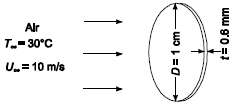Suppose the resistor in Problem 7.33 is rotated so that its axis is aligned with the flow.
Question:
Suppose the resistor in Problem 7.33 is rotated so that its axis is aligned with the flow. What is the maximum permissible power dissipation? From Problem 7.33: An electronic circuit contains a power resistor that dissipates 1.5 watts. The designer wants to modify the circuitry in such a way that it will be necessary for the resistor to dissipate 2.5 watts. The resistor is in the shape of a disk 1 cm in diameter and 0.6 mm thick. Its axis aligned with a cooling air flow at 30?C and 10 m/s velocity. The resistor lifetime becomes unacceptable if its surface temperature exceeds 90?C. Is it necessary to replace the resistor for the new circuit?GIVENA heat generating resistor disk with its axis aligned with a cooling airflowHeat generation rate (QG) = 2.5 WDisk diameter (D) = 1 cm = 0.01 mDisk thickness (t) = 0.6 mm = 0.0006 mAir temperature (T??) = 30?CAir velocity (U??) = 10 m/sMaximum surface temperature (Ts) = 90?CASSUMPTIONSHeat transfer from the edges is negligibleThe heat flux is equal from bothfaces

Step by Step Answer:

Principles of heat transfer
ISBN: 978-0495667704
7th Edition
Authors: Frank Kreith, Raj M. Manglik, Mark S. Bohn





